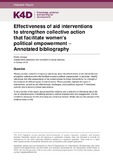| dc.description.abstract | There is significant rigorous evidence that collective action can play an important role in facilitating women’s political engagement, and in advancing women’s empowerment in formal and informal politics, in low-, middle- and high-income countries.
Certainly, collective action does not automatically lead to engagement and empowerment. Further, it does not always lead to all aspects of political empowerment being realised (e.g. voice, plus access, plus participation, plus influence, plus power in formal and informal politics), let alone success in obtaining all the political outcomes collective actors had aimed for. Conversely, women’s political engagement and empowerment do not result only from collective action. For example, there are also individual pathways to engagement and empowerment. Moreover, women do not necessarily promote gender equality, and collective action by women (and men) does not necessarily lead to women’s political empowerment (WPE).
Nonetheless, a range of rigorous empirical studies, spanning multi-country qualitative studies, ethnographies, in-depth literature reviews, and large quantitative studies, have found that collective action, under the right conditions, has been one important historical and contemporary way in which the women involved have successfully achieved voice, access, participation, influence, and power, and have advanced gender equality for their societies at large. Box 1 at the end of this overview provides a selection of references published in the last 10 years about the relationship between collective action and women’s political empowerment and engagement. These references offer entry points to the nuances of the evidence base in low- and middle-income countries (LMICs), showing when, how, and why collective action has contributed to WPE and their engagement.
Despite the importance of collective action for WPE, a rapid review of the literature conducted for this report found only limited rigorous evidence about aid interventions in low- and middle-income countries in this area. This small evidence base was encountered when looking at interventions focused on WPE that had a component on formal or informal collective action, and when looking at interventions focused on formal or informal collective action that, wittingly or not, resulted in WPE (see section 2 for details). In this context, the present annotated bibliography presents a selection of the most rigorous references it identified about the effectiveness of aid interventions for collective action that have facilitated WPE. | en |

